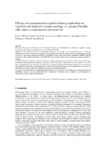Efficacy of a computerized cognitive training application on cognition and depressive symptomatology in a group of healthy older adults: a randomized controlled trial

Use this link to cite
http://hdl.handle.net/2183/14931
Except where otherwise noted, this item's license is described as Creative Commons Attribution-NonCommercial-NoDerivatives 4.0 International License (CC-BY-NC-ND 4.0)
Collections
- Investigación (FCS) [1293]
Metadata
Show full item recordTitle
Efficacy of a computerized cognitive training application on cognition and depressive symptomatology in a group of healthy older adults: a randomized controlled trialAuthor(s)
Date
2015-08-20Citation
Millán-Calenti JC, Lorenzo T, Núñez-Naveira L, Buján A, Rodríguez-Villamil JL, Maseda A. Efficacy of a computerized cognitive training application on cognition and depressive symptomatology in a group of healthy older adults: a randomized controlled trial. Arch Gerontol Geriatr. 2015 Aug 20 In Press
Abstract
[Abstract] Objective. The purpose of this study was to evaluate the efficacy of a multimedia and interactive cognitive program on cognition and depressive symptomatology in healthy older adults.
Methods. Adults aged ≥65 years were randomly assigned to two groups: the experimental group in which the participants received a computerized cognitive training application; and the control group in which the participants received no intervention during the protocol. Performance on the mini-mental state examination (MMSE) and the short-form of the geriatric depression scale (GDS-SF) were analysed using a three-way repeated-measure analysis of variance.
Results. To determine cognition after the training, the cognitive program was used and the results were assessed using the MMSE, indicating that the significant time effects within the groups reflected the score for cognitive assessment that was significantly better after the intervention in the experimental group. No significant differences were observed with regard to the depressive symptomatology or between the groups according to sex or educational level on the two dimensions previously established (cognition and depressive symptomatology).
Conclusion. The development of technological applications for intervention in older adults is increasing. Based on the established objective, we can conclude that the computerized intervention may constitute a good alternative to enhance the cognitive status in older people.
Keywords
Randomized controlled trial
Older people
Computerized cognitive training
Cognition
Depression
Older people
Computerized cognitive training
Cognition
Depression
Editor version
Rights
Creative Commons Attribution-NonCommercial-NoDerivatives 4.0 International License (CC-BY-NC-ND 4.0)






